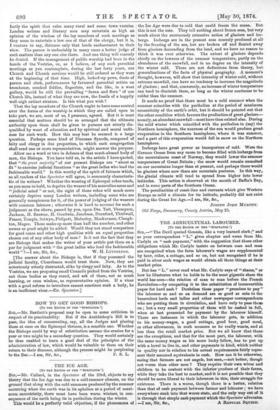THE ICE AGE.
[To TER EDITOR OF TEl " SPECTATOR:] SIR,—Mr. Canard, in the Spectator of the 23rd, objects to my theory that the Ice Age was due to a cold summer climate, on the ground that along with the cold summers produced by the summer occurring when the earth was in its aphelion at a period of. maxi- mum eccentricity, there must have been warm winters, in con- sequence of the earth being its in perihelion during the winter.
This would be a perfectly valid objection, if the phenomena of
the Ice Age were due to cold that could freeze the ocean. But• this is not the case. They tell nothing about frozen seas, but very much about the enormously extensive action of glaciers and ice-- bergs. Icebergs are in the present seas scarcely produced at all• by the freezing of the sea, but are broken off and floated away from glaciers descending from the land, and we have no reason to think it was ever otherwise. The extent of glaciers depends- chiefly on the lowness of the summer temperature, partly on the abundance of the snowfall, and in no degree on the intensity of the winter cold. These are not deductions from theory, but. generalisations of the facts of physical geography. A moment's thought, however, will show that intensity of winter cold, without extreme snowfall, can have no tendency to increase the magnitude of glaciers ; and that, conversely, no increase of winter temperature can tend to diminish them, so long as the winter continues to be- colder than the summer.
It needs no proof that there must be a cold summer when the summer coincides with the perihelion at the period of maximum eccentricity of the earth's orbit, but it should be pointed out that the other condition which favours the production of great glaciers— namely, an abundant snowfall—most have then existed also. During the mild winter which coincided with the perihelion in (say) the Northern hemisphere, the nearness of the sun would produce great evaporation in the Southern hemisphere, where it was summer, and a part of this evaporation would fall in snow on the Northern hemisphere.
Icebergs have great power as transporters of cold. Were the- German Ocean from any cause to become filled with icebergs from the mountainous coast of Norway, they would lower the summer temperature of Great Britain ; the snow would remain unmelted on our mountains longer than at present, and perhaps there would be glaciers where now there are mountain pastures. In this way, the glacial climate will tend to spread from higher into lower latitudes. This action is observed at the mouth of Baffin's Bay, and in some parts of the Southern Ocean.
The peculiarities of coast-line and currents which give Western Europe so mild a climate for its latitude, probably did not exist during the Great Ice Age.—I am, Sir, &c.,


































 Previous page
Previous page